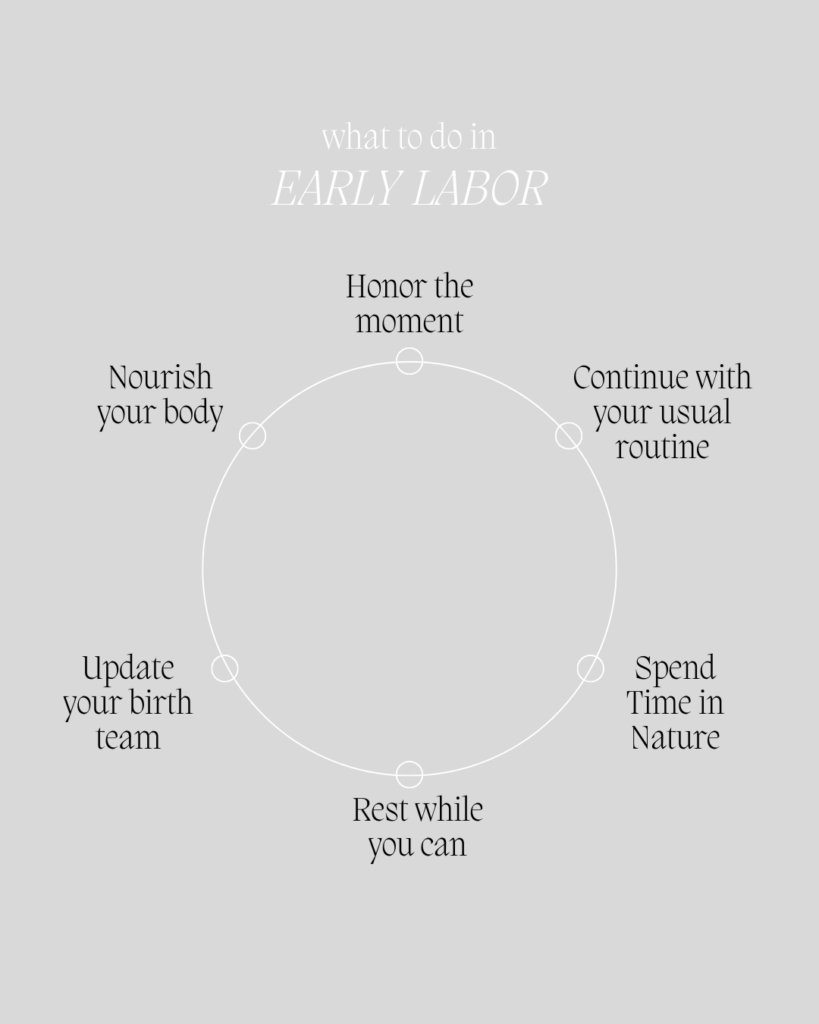the blog
Natural Birth & Female Health

You might be experiencing some early signs of labor
…Or maybe you’re pregnant and wanting to prepare for birth.
As you get closer to the labor horizon, the feelings of excitement and maybe a bit of nervous energy come and go in waves until the day comes when your baby and your body are ready for birth.
The number one mistake new moms make when labor starts…rushing into labor.
Often new moms feel the initial wave of excitement or flash of nerves when they realize their labor has started. Totally Normal.
But that is not the time to rush into things like calling the birth team or diving into labor exercises that can tire you out before the more intense phase of birth begins. This is the time for a deep breath.
The last thing you need at the start of labor is family and friends calling for updates or your birth team surrounding you.
The feeling of being watched can slow down or stop your labor!
I often hear the avoidable story of calling the birth team or going to the hospital at the first sign of labor. Or sleeping at night or walking up and down stairs for hours trying to speed up the birth during the early phase of labor
…all of which can slow labor down or leave mamas with little to no energy.
Maternal exhaustion is real and you want to avoid this if you can
INSTEAD use this as your reminder to pause. If you’re having signs of early labor, check in with your body and your intuition.
Listen to the needs of your body.
Here is what you’ll discover reading on
1 what to ACTUALLY do when your labor begins
2 how to support your hormones and your pelvic bowl to facilitate a smooth labor
3 all while avoiding complications
Don’t know if your labor has even begun??
Learn to recognize early labor signs, get familiar with common signs of early labor.
RELATED: How to Know I’m In Labor? Early Signs of Labor And What They Mean
You can confirm that you are beginning your journey to birthing your baby
So, What to do When Your Labor Starts?

1. Center yourself and honor this moment
It can be as simple as a deep breath to center yourself, to channel your excitement, ground yourself and overcome any immediate fears or doubts.
Experiencing some of the first signs of labor can be exciting and can generate a wave of energy.
Taking a moment to celebrate before returning to your typical routine can help channel that energy
2. Continue with your typical routine
Once you have embraced the start of your labor, do your best to continue with your typical day or night.
If your labor starts at night, try your best to honor your sleep schedule.
If your labor starts during the day, try your best to honor your original plans.
You’ll want to honor your typical routine because you could be in this phase of labor for hours or days. Early labor is often times the longest phase of labor.
It is different for each mama and for each pregnancy because so many factors affect the length of your labor–>
- how hormones are unfolding
- how engaged is your baby
- what position is your baby in
- tension or trauma
- hydration & nourishment
- physical & emotional well-being
- lifestyle
- stress coping tools
- birth setting
- birth team
RELATED: How to Have A Smooth Safe Labor
Should I time my contractions?
NOPE.
While it can be insightful for your birth team to have an idea of what your contraction pattern is, we want to focus more on supporting our labor instead of analyzing it.
Unless the information, from timing contractions or doing vaginal exams, will serve us in making informed choices about how to move forward in labor, its best to not pull the laboring mama out of her process.
If gathering information about your contraction pattern is important for you to know of will help you navigate next steps, let your support person or birth team time contractions.
NOTE: Watching the clock, using your phone, & analyzing data can actually slow down your contractions.
As a homebirth midwife, I tell my mamas, birth is a space outside of time. We don’t want to be focusing on time, or marking calendars or putting a clock on birth…or pregnancy or postpartum.

3. Honor your body’s needs
Birth can be a marathon, lasting for hours or days, and since we can never really predict how long labor will be, we want to take advantage and honor our needs while and when we can to avoid complications.
Rest
While we recommend movement and doing your typical daily routines, make sure you’re resting as needed throughout the day.
Especially if it is night time. Honor your typical night rituals and sleeping patterns.
Going through usual night time rituals before bed helps you relax while supporting your hormones.
Yessss Mama this is the time to use that favorite face cream, take a long bath, have a calming tea prepared for you
all that self care and pampering releases hormones that support the progression of your labor.
Don’t hold back on the rituals…doing routine activities throughout the day and into the night activates Flow State-a state of mind that helps regulate hormones and drops mama’s into that primal brain we want to access in labor.
Maybe put on a playlist, an audiobook, or birth meditation, close your eyes and rest.
Early labor is time to ease yourself into the more intense phases of birth, you’ll want to conserve energy for the more demanding phases of active labor and pushing phase.
Nourish and hydrate.
Our bodies need energy and electrolytes for our muscle groups to contract and our brain to function. We need healthy fats and quality water for hormone production and function.
Staying nourished and hydrated helps your labor progress smoothly and safely while keeping you and your baby healthy and strong in order to endure the demands of birth and immediate postpartum.
>> Well nourished mama’s are less likely to experience clinical exhaustion, ask for an epidural, need IV fluids, experience blood loss, have difficulty tolerating blood loss.
>> Well nourished and oxygenated babies are less likely to experience fetal distress, have difficulty tolerating contractions, experience bradycardia (low fetal heart tones), need respiratory support at birth, have low apgar scores, struggle with latching and breastfeeding.
Nourish your body while you still have an appetite in early labor because you may not have an appetite once in active labor, or you may not be able to keep food down later in labor.
Empty your bladder
Pee when you have the urge or at least every couple of hours to avoid –>
- a full bladder prohibits fetal decent into the maternal pelvis and can affect your baby’s optimal fetal position. Basically a full bladder can affect baby’s position and keep them from moving through the pelvis. A full bladder can also lead to bladder rupture in extreme cases.
- a UTI. Hormone changes in pregnancy create pH changes that can lead to UTI’s. UTI’s can stimulate preterm labor, frequent, short and ineffectual but painful contractions that tire the uterine muscle leading to maternal exhaustion, maternal hemorrhage and other complications in birth.
4. Movement
Create opportunities for baby to adjust and navigate the pelvis and releases muscle tension through movement.
Get your blood flowing. Good circulation nourishes your body, distributes hormones that support a smooth labor pattern, and clears toxins from your system.
Also, oxygenating your body through good circulation improves mood and supports good rest periods.
Deep breathes and good blood circulation from walking outdoors, helps oxygenate your vital organs and your baby. Oxygen can act as a natural pain relief from contractions and other labor discomforts.
Introducing movement like walking, dancing, and stretching can support baby’s optimal position for your pelvis type and create space in your pelvis for baby to change positions as they navigate the different levels of your pelvic bowl.
Rebozo
In early labor you can wear the baby wrap like a belly wrap to help lift your belly and engage your baby into a better position in the pelvic bowl.
Here is a link to one of my favorite baby wraps if you don’t have one already or if you’re like me and want a couple wraps for the home, for the car and for a spare while the other air dries you can have. I love the Organic Stone and the Black Boba Wraps.
Spinning Babies by Gail Tully is another form of intentional movement. Spinning Babies includes different exercises to open the pelvic bowl and facilitate good fetal position. (Insert SB link here)If you haven’t tried a Spinning Babies series in pregnancy, early labor is a good time to explore different exercises that will support your body, your baby and your labor.
5. Spend time outside
Spending time outside throughout the day exposes us to different wavelengths of light that differ depending on the time of day. Each of those light wavelengths stimulates a bodily function. This system regulation is our circadian rhythm.
Our circadian rhythm supports hormone production and hormone release that stimulates smooth labor patterns, blood pressure, mood, rest and appetite.
Calibrating your circadian rhythm in labor connects your labor to the rhythms of the day and supports periods of progress and periods of rest and recovery in labor.
Spending time outdoors allows us to breath fresh air, clear our third eye, and ground our central nervous system.
Being in nature is removing yourself from the distractions and disturbances of society and technology that can affect your nervous system, your hormones, and your brainwaves, all of which play a role in a smooth safe and short labor.
Connecting to nature in labor is one of the more primal forms of laboring. Part of labor is stripping away social layers and embodying our most raw, authentic, primal selves.
Deepening your connection to nature can create a foundation for your primal instincts to guide you in a more biology based birth.
6. Update your birth team
Who should I notify that I am in labor?
As you head into your due window, you’ll likely be in close communication with your birth team. Sending them updates about any changes in your body or any signs of early labor can help them prepare for your labor.
The more your birth team knows, the better they can support you and your baby.
Information birthworkers receive about your labor progress helps them assess and make decisions about next steps in your care.
Should I tell my family that I am in labor?
Announcing that your labor has started can rally the support of your community but sometimes it can create pressure and disruptions in your labor process.
It might be appropriate to update your birth team but it may be too early to call them over. Likewise you might want to consider waiting to update friends and family.
Even well intentioned family and friends can disrupt your labor, especially when boundaries haven’t been established ahead of time. Receiving messages and calls from family and friends asking about how the labor is going or asking if baby has been born yet can create the feeling of being watched or place a clock on birth.
Even just the act of picking up your phone to read and message your community can keep you from progressing into active labor.

Your body knows what to do and when.
How you feel, how your body feels, where you hold tension, what position your baby is in, and how developed your baby is-are important pieces that need to come into alignment for a smooth birth.
When we disrupt the natural flow of labor or when we try to rush labor, we could affect how the pieces come together.
The best way to support yourself and baby in labor is to listen to the needs of your body. Trust your body will communicate with you and that it will tell you when things are good or when things need attention.
I am a Nationally Certified Midwife, a Biology Based Homebirth Guide, an educator and an advocate for autonomy in female health. I started this blog after supported hundreds of women in natural, undisturbed birth and I want to deconstruct the medical model narrative around birth by sharing the true informed choice with women like you.
If this is helpful or you want more clarity on this topic find me on IG @thesierraco. I welcome your questions!